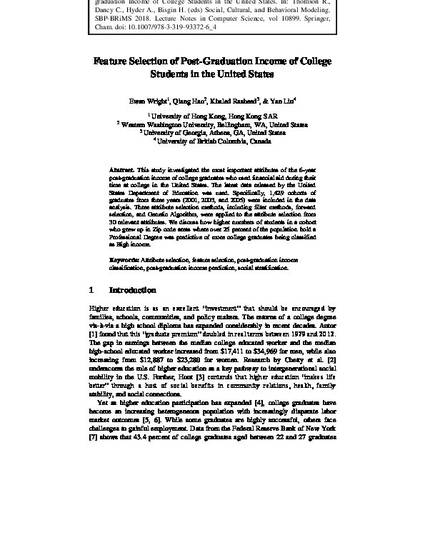
Article
Feature Selection of Post-Graduation Income of College Students in the United States
International Conference on Social Computing, Behavioral-Cultural Modeling and Prediction and Behavior Representation in Modeling and Simulation
(2018)
Abstract
This study investigated the most important attributes of the 6-year post-graduation income of college graduates who used financial aid during their time at college in the United States. The latest data released by the United States Department of Education was used. Specifically, 1,429 cohorts of graduates from three years (2001, 2003, and 2005) were included in the data analysis. Three attribute selection methods, including filter methods, forward selection, and Genetic Algorithm, were applied to the attribute selection from 30 relevant attributes. We discuss how higher numbers of students in a cohort who grew up in Zip code areas where over 25% of the population hold a Professional Degree was predictive of more college graduates being classified as High income.
Keywords
- attribute selection,
- Feature selection,
- post-graduation income classification,
- post-graduation income prediction,
- social stratification
Disciplines
Publication Date
Summer June 14, 2018
DOI
10.1007/978-3-319-93372-6_4
Citation Information
Wright, E., Hao, Q., Rasheed, K., & Liu, Y. (2018, July). Feature Selection of Post-graduation Income of College Students in the United States. In International Conference on Social Computing, Behavioral-Cultural Modeling and Prediction and Behavior Representation in Modeling and Simulation (pp. 38-45). Springer, Cham.
